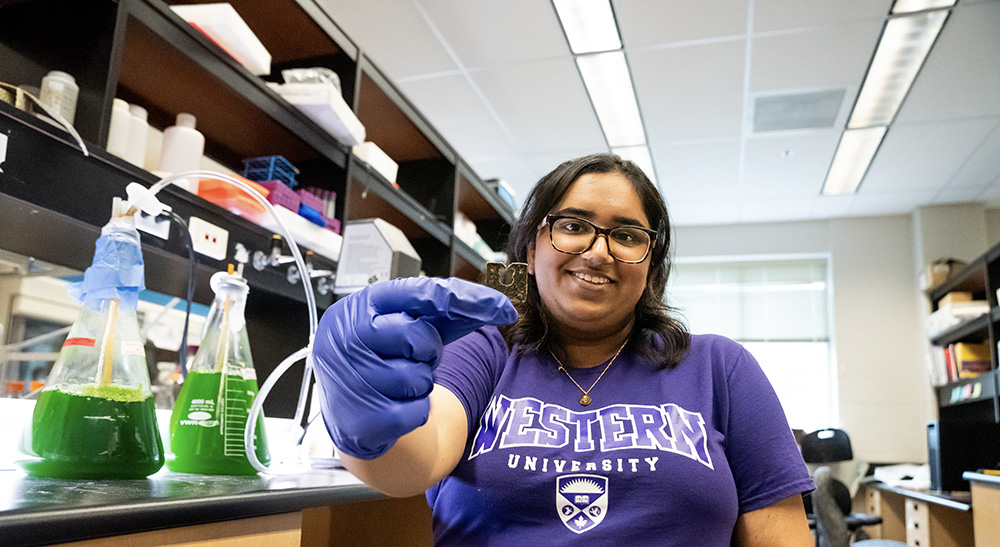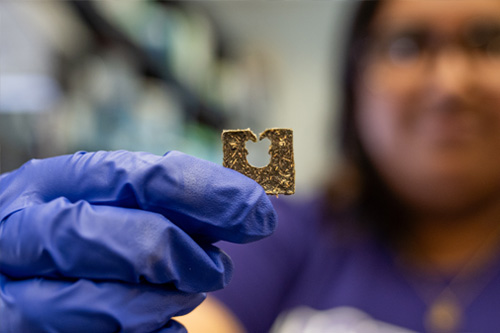Media
Contact
Communications Specialist
Faculty of Engineering
Spencer Engineering Building
Room 2072
Western University
Tel: 519-661-2111 ext. 87015
Email: engineeringcomms@uwo.ca
Summer Internship helps break new ground in sustainable plastics research

Rebecca Koshy with a bread bag clip made of biodegradable bioplastic. The mixture she developed includes a hydrophobic coating of beeswax, which makes the material water resistant. (Jacob Arts/Western Engineering).
Plastic pollution is a global crisis with far-reaching environmental and economic implications. While plastic offers countless benefits, its non-biodegradable nature has led to an alarming accumulation in landfills and oceans. Rebecca Koshy, a fourth-year chemical and biochemical engineering student at Western University, has taken a remarkable step toward addressing this issue by pioneering an innovative solution – biodegradable bioplastics.
Koshy’s research, conducted as part of an Undergraduate Summer Research Internship (USRI) program, focused on creating sustainable alternatives to traditional plastics using materials sourced from wastewater, forest waste, and food waste. Her project aimed to develop bioplastics that mimic the functionality of conventional plastics while degrading naturally over time.
“Despite the numerous benefits of plastics, their environmental impact is undeniable. The objective of my project was to find a way to create plastics that serve their purpose without leaving a lasting negative footprint,” explained Koshy.
To achieve this goal, Koshy identified key materials and their precise ratios to create biodegradable bioplastics. The mixture she discovered incorporates algae, polysaccharide (derived from orange peels), glycerol (from plant and animal fats and oils), pine needles, and a hydrophobic coating of beeswax.
 “The incorporation of forest waste, like pine needles, has been instrumental in enhancing the bioplastic's structural integrity, while the use of a polysaccharide and glycerol adds strength and flexibility,” she added.
“The incorporation of forest waste, like pine needles, has been instrumental in enhancing the bioplastic's structural integrity, while the use of a polysaccharide and glycerol adds strength and flexibility,” she added.
One remarkable feature of this bioplastic is its hydrophobic properties, thanks to the beeswax coating. This property makes the bioplastic water-resistant and prevents immediate dissolution when submerged in water, adding an additional layer of durability and longevity to the material.
When asked about the potential impact of this innovation, Koshy stated, “The implications are vast. Biodegradable bioplastics could significantly reduce plastic pollution and associated environmental damage. It could also lead to a substantial reduction in carbon emissions by utilizing natural and renewable resources from waste sources.”
The greater impact of Koshy’s innovation extends to various stakeholders. The environment stands to benefit significantly from reduced plastic pollution, while consumers will have access to more eco-conscious products. Industries that embrace these sustainable materials can enhance their corporate responsibility image and lead market trends toward environmentally friendly practices.
Koshy expressed pride in participating in the project, emphasizing the importance of contributing to sustainable practices and responsible consumption. "The opportunity to play a role in advancing sustainable practices and offering a potential solution that aligns with environmental protection and responsible consumption is truly gratifying,” she added.
Participating in the USRI program has provided Koshy with valuable insights into chemical engineering. She highlighted the practical application of classroom concepts, refining her understanding of chemical processes and their real-world implications. Through experimentation, data analysis, and problem-solving, Koshy has honed her skills in designing and conducting experiments.
"Research has shown me the iterative nature of discovery, where failures and setbacks are opportunities for growth," Koshy shared, underlining the resilience and adaptability she gained through the program.
Koshy encouraged fellow students to engage in research, highlighting the tangible benefits of hands-on involvement. “Research enriches your educational journey, offering a sense of purpose and accomplishment as you actively address real-world challenges and pioneer innovative solutions.”
Rebecca Koshy’s research at Western is not only a testament to the potential of sustainable materials but also a shining example of the positive impact that students can have on global challenges through research and innovation.

